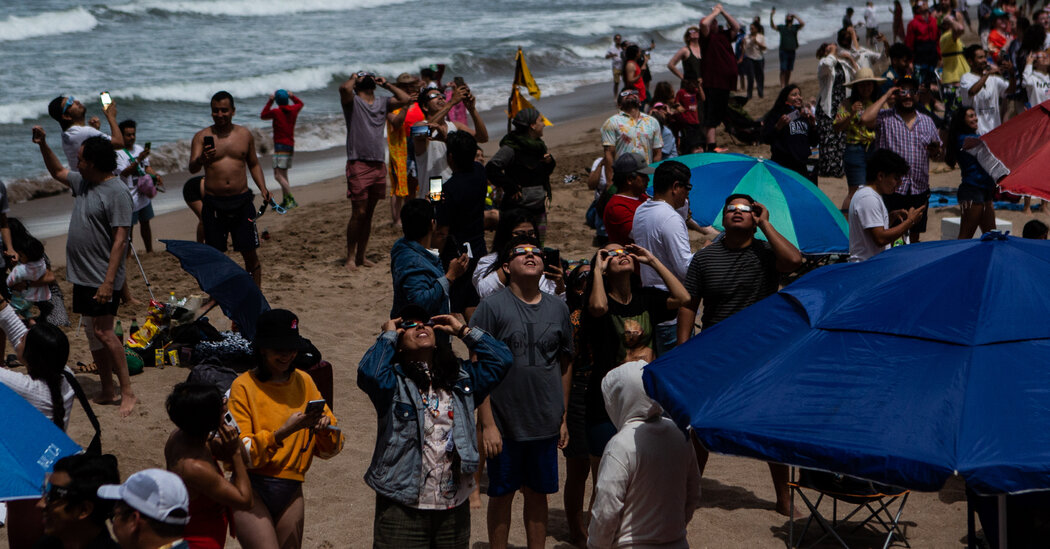The eclipse brought daytime darkness to North America
Millions of people across North America gathered outside yesterday to behold the disorienting, disquieting wonder of darkness in the daytime.
About 32 million people live along the eclipse’s path, which stretched from central and northern Mexico through the U.S. and across pockets of eastern Canada. Countless others drove to view it, sending an economic boost through some sleepier parts of the U.S.
As the silvery glow of the corona materialized, the temperature dropped. At some watch parties, the celestial show was greeted with cheers and applause. (I watched in a park in Brooklyn where thousands of people had gathered. When the sun was most covered, many began cheering.)
The consensus among eclipse veterans watching along the Mississippi River was that it was a superior event. “It was definitely darker than last time,” said Johnathon Bish, who saw the 2017 total eclipse from Frederick, Mo. “A completely different experience.”
In Houlton, Maine, a town in the path of totality, the eclipse brought years of planning and waiting to breathtaking fulfillment. As the sun darkened, the crowd quieted and couples wrapped their arms around each others’ shoulders. Time seemed to stop for three minutes, and then, too soon, sunlight flared. “I would pay a million dollars to see that again,” said Sebastian Pelletier, 11, a Houlton resident.
In the future: The next opportunity to see a total solar eclipse in the 48 contiguous U.S. states and Canada is 2044.
The Vatican called gender changes an affront
A new Vatican document, approved by Pope Francis, stated that gender fluidity and transition surgery, as well as surrogacy, amounted to affronts to human dignity.
It is likely to be embraced by conservatives for its hard line against liberal ideas — and to stir fears that it will be used as a cudgel against transgender people. The Vatican also included a warning of “unjust discrimination,” especially in places where gay or transgender people are criminalized and imprisoned, a sign reflecting the tightrope Francis has tried to walk.
Criticism: The director of a group that advocates for L.G.B.T.Q. Catholics said the document showed a “stunning lack of awareness of the actual lives of transgender and nonbinary people.”
Returning to an unrecognizable Khan Younis
Gazans began returning to the city of Khan Younis after Israel withdrew its ground troops from southern Gaza over the weekend.
Some found only destruction. “You build a home corner by corner, stone by stone,” said Dr. Ahmad al-Farra, 54, who ran the pediatric ward at Nasser Hospital before his family fled to Rafah. “And in the end, with a press of a button, it is reduced to rubble.”
What’s next: Gazans fear Israel’s promise to send ground troops into Rafah, an invasion that many think will come after the end of Ramadan this week.
The Hague: Nicaragua is bringing a case against Germany for supplying arms to Israel.
MORE TOP NEWS
People in China are outraged over “3 Body Problem,” a Netflix adaptation of one of the country’s most celebrated works of science fiction. The anger, particularly over how the Cultural Revolution was depicted in the opening scene, highlights how Chinese censorship has shaped public opinion, Li Yuan writes in a Times column.
The end of ‘Curb Your Enthusiasm’
Larry David’s HBO comedy “Curb Your Enthusiasm” ended on Sunday. Wesley Morris, a Times critic, watched the whole series. (That’s 12 seasons of screen time.) In an essay, he argues that David is one of the greatest-ever interpreters of U.S. manners.
“Television has never had anything like this show,” Wesley writes, “nothing as uncouth and contradictory and unhinged and yet somehow under a tremendous amount of thematic control, nothing whose calamity doubles as a design for living.”

